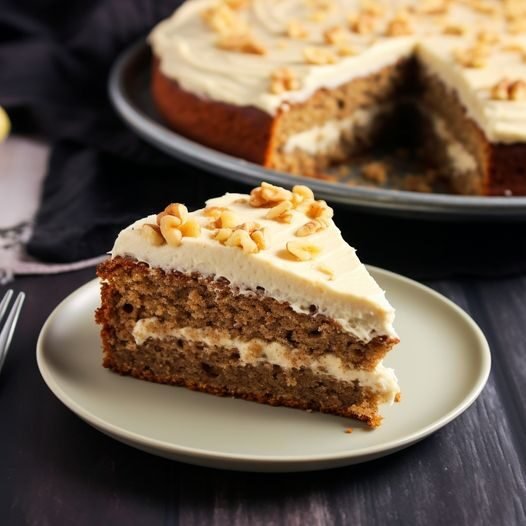Vegan Banana Cake Recipe is a moist and delectable dessert that’s perfect for using up ripe bananas. This plant-based version of a classic banana cake is not only cruelty-free but also incredibly flavorful. With the natural sweetness of ripe bananas and the richness of vegan ingredients, this cake is a delightful treat for vegans and non-vegans alike. Whether served for dessert, breakfast, or any time you’re craving a slice of goodness, this Vegan Banana Cake is sure to satisfy your taste buds. Let’s dive into the recipe!
Ingredients:
For the Cake:
- 3 ripe bananas, mashed
- 1/2 cup unsweetened applesauce
- 1/3 cup vegetable oil (or melted coconut oil)
- ONE teaspoon vanilla extract
- 1 1/2 cups all-purpose flour
- 1 teaspoon baking soda
- 1/2 teaspoon baking powder
- 1 cup granulated sugar
- 1/2 teaspoon salt
- 1/2 teaspoon ground cinnamon
- 1/4 teaspoon ground nutmeg (optional)
For the Vegan Cream Cheese Frosting:
- 1/2 cup vegan butter, softened
- 8 oz (1 cup) vegan cream cheese, softened
- 4 cups powdered sugar
- 1 teaspoon vanilla extract
Instructions:
For the Cake:
- Preheat your oven to 350°F (175°C). Grease a 9×9-inch (23×23 cm) square baking pan or a similar-sized cake pan.
- In a large mixing bowl, combine the mashed ripe bananas, unsweetened applesauce, vegetable oil, granulated sugar, and vanilla extract. Mix well until the ingredients are thoroughly combined.
- In a separate bowl, whisk together the all-purpose flour, baking soda, baking powder, salt, ground cinnamon, and ground nutmeg (if using).
- Gradually add the dry ingredients to the wet ingredients, mixing until just combined. Be careful not to overmix; a few lumps are fine.
- Pour the cake batter into the prepared baking pan, spreading it evenly.
- Bake in the preheated oven for about 25-30 minutes, or until a toothpick inserted into the center comes out clean or with a few moist crumbs.
- Remove the cake from the oven and allow it to cool in the pan for about 10 minutes. Then, transfer it to a wire rack to cool completely.
For the Vegan Cream Cheese Frosting:
- In a mixing bowl, beat the softened vegan butter and vegan cream cheese together until creamy and well combined.
- Gradually add the powdered sugar and vanilla extract, continuing to beat until the frosting is smooth and fluffy.
Assembly:
- Once the cake has completely cooled, spread the Vegan Cream Cheese Frosting evenly over the top.
- Slice, serve, and enjoy your Vegan Banana Cake!
Nutrition Facts:
(assuming 1/12th of the cake with frosting):
- Calories: 410
- Total Fat: 17g
- Saturated Fat: 6g
- Cholesterol: 0mg
- Sodium: 340mg
- Total Carbohydrate: 63g
- Dietary Fiber: 1g
- Total Sugars: 45g
- Protein: 2g
Gut Health:
Plant-based diets are often associated with improved gut health due to the high fiber content from fruits, vegetables, and whole grains. A healthy gut microbiome is linked to better digestion and overall well-being.
Anti-Inflammatory Properties:
Many plant-based foods have anti-inflammatory properties, which can help in reducing inflammation in the body. Chronic inflammation is associated with various health issues, and a vegan diet may contribute to its prevention.
Sports Performance:
Contrary to the misconception that vegan diets lack protein, many successful athletes follow plant-based diets to enhance their performance. Plant-based proteins can support muscle building and recovery.
Reduced Risk of Foodborne Illnesses:
Plant-based diets eliminate the risk of foodborne illnesses associated with the consumption of undercooked or contaminated animal products.
Economic Impact:
A vegan diet can be more economical as plant-based protein sources tend to be cost-effective compared to some animal products. It may be a budget-friendly option for individuals or families.
Mindful Eating:
Adopting a vegan lifestyle often promotes mindful eating. Being more conscious of food choices and sources can lead to a healthier relationship with food and a greater appreciation for the environmental impact of dietary decisions.
Preservation of Biodiversity:
The expansion of animal agriculture often leads to habitat destruction and loss of biodiversity. Choosing a vegan diet supports the preservation of ecosystems and the protection of various species.
Culinary Diversity:
Veganism introduces individuals to a diverse range of cuisines and ingredients from around the world. Exploring plant-based cooking can be a culinary adventure, embracing flavors and techniques from different cultures.
Reduced Antibiotic Resistance:
The use of antibiotics in animal farming contributes to the rise of antibiotic-resistant bacteria. Opting for a vegan diet can be a way to reduce the demand for such practices and promote responsible antibiotic use.
Cruelty-Free Beauty and Personal Care:
Veganism extends to beauty and personal care products. Choosing cruelty-free, vegan alternatives ensures that your lifestyle aligns with ethical choices beyond just dietary preferences.
